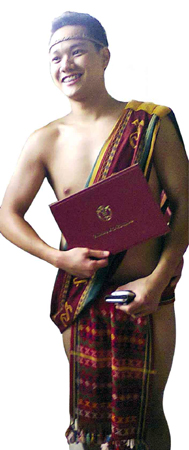
BRILL Degay Daupan, 22, takes pride in his native roots and wears it during his graduation at UP Baguio. JHOANNA MARIE BUENAOBRA/ INQUIRER NORTHERN LUZON
BAGUIO CITY—Ecru Filipiniana for women and Barong Tagalog for men worn with the sablay are the usual attire combinations for University of the Philippines (UP) graduates.
But three Cordillerans chose to wear their pride and marched in their sablay and their indigenous bahag (G-string) and tapis during the UP Baguio graduation at the Baguio Convention Center on Monday.
“I want to show what the Igorot can do. I want everyone to know that I am an Igorot and I earned a degree from UP. By wearing this, I was able to show my identity,” said Brill Degay Daupan, 22, a BA Social Sciences graduate who traces his roots to Sagada town, Mt. Province.
Kyle James Solar, 22, a BS Biology graduate, also marched in his G-string and sablay.
“I’m proud of my roots and it is only proper that I show people this pride,” said Solar, former chair of the Program for Indigenous Culture-Paggawisan Tako Am-in (PIC-Pagta), a student organization of indigenous peoples in UP Baguio.
Solar was raised in Baguio City by his mother, who is from Barlig town in Mt. Province, and his father, a native of Pangasinan province.
He said joining PIC-Pagta made him more aware of his Cordilleran roots.
Daupan, a former university student council chair, is the third UP Baguio graduate in his family but the first to wear traditional Cordilleran attire during graduation.
His older brother is a BS Computer Science graduate while his sister is a BS Biology graduate.
“He is the last among the family to wear the sablay. We’re very proud, even though I’m an Igorot only by affiliation. We not only follow the traditional practices, we try to embrace it,” said Daupan’s mother, Josie, 57.
Daupan was raised in Baguio City by his mother, a Tagalog, who made sure that her children were exposed to their father’s roots and culture in Mt. Province.
“Our mother would let us go to our own ili (community) in Sagada and spend some time with our relatives there and get immersed in our own culture, that of the Igorot,” he said.
Another graduate, Lindsel Ekid, who earned her Master of Arts in Language and Literature degree, wore a tapis, a traditional Cordillera wraparound skirt, and a Filipiniana blouse during the ceremony.
Ekid, 28, who traces her roots in the village of Tocucan in Bontoc town, Mt. Province, wore a tapis handwoven by her great grandmother.
“I wear this as a tribute and to honor her skill and talent,” she said.
She said her parents would tell her stories about their community, culture and struggles. She remembered her parents telling her to value her ethnicity, she said.
UP Baguio Vice Chancellor for Academic Affairs Wilfredo Alangui said the university had no policy against students wearing the Cordillera’s traditional attire during graduation.
He said graduation was an occasion where wearing these attires is appropriate.
“In important occasions, Cordillerans wear their traditional attire. I guess graduation is one event that it is appropriate. It’s really not unusual,” Alangui said.
UP Baguio College of Science professor Andrei Domogo said wearing G-strings and tapis was a common practice in Cordillera school activities.
“Here in UP, I think the sablay goes well with the G-string,” said Domogo, who also wore a G-string when he earned his master’s degree in mathematics last year.